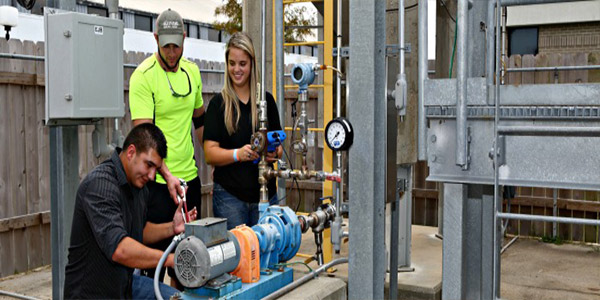Diploma in Instrumentation Technology
All industries require controls and measurements of equipments and parameters leading to automation of industrial processes. Accurate and reliable measurements lead to better quality of products. Hence, quality of measurement and instrumentation is an important aspect studied during the course of instrumentation technology.
An instrumentation technology program is designed for entry-level technicians. Students are trained to work in places such as chemical plants, electrical power plants, oil refineries and cross-country pipeline companies; they can also work in instrumentation maintenance positions and instrumentation sales.
In the field of instrumentation technology, technicians operate or develop precise measuring and analytical tools with a wide variety of applications. Instrumentation technology requires engineering knowledge and technical skills. In order to enter into an instrumentation technology position, prospective students typically must possess field experience and either an associate’s or bachelor’s degree.
Instrumentation engineering is one of the complicated but sophisticated branches of engineering discipline which may be studied as a separate branch or along with electronics engineering. The study mainly focuses on the design, configuration and automated systems. The professionals who are involved in these activities are known as instrumentation engineers.
Instrumentation engineers usually work in industries with automated processes, such as chemical or manufacturing plants with the goal of improving system productivity, reliability and stability. They are responsible for the design, construction and maintenance of instruments and entire instrumentation systems. Instrumentation engineers also decide the type of instruments required for ensuring better quality and efficiency of the end product. Hence they are considered to be essential positions in the industrial manufacturing sector.
Skills Required
You need good communications skills to succeed in this field. A writing course, and probably a public speaking course, should be part of your program even if they are not required.
The coursework in an associate’s instrumentation technology degree program includes intensive studies in mathematics, applied sciences and technology.
- Basic Electronics.
- Digital Microprocessor Systems.
- Electrical Circuits.
- English Composition.
- Instrumentation Electronics.
- Process Controls.
- Process Measurements.
- Technical Math.
- Technical Physics/Principles of Technology.
Eligibility & Admission
- 10th Pass.
- The basic eligibility requirement for the diploma in instrumentation engineering is that the candidate must pass class 10. A class 12 pass candidate is also eligible to appear for the course. The minimum age requirement is 15 years. An entrance exam is held for admission in the diploma course in instrumentation engineering.
Higher Studies
One can also go for Diploma program after completion of his/her class 10th. In this case he/she will be recognized with the status of a junior engineer.
One, who still wants to study further after completing BE/BTech, can pursue MTech program offered by Indian Institutes of Technology and few other engineering colleges in the country.
Individuals with interests in research areas can pursue PhD after his/her post graduation studies for carrying out research works.
AMIE Associate Memberships of the Institution of Engineers also offers courses in Electronics and Instrumentation engineering which are equivalent to BE/BTech provided by other institutes/universities.
Job prospects
Instrumentation engineers, depending on which field they work in, can also be known as electrical and electronic engineering
technicians and industrial engineering technicians. These positions are typically found in industries that require automated processes.
There are numerous opportunities for job for a candidate with a diploma degree in instrumentation engineering. Various companies that deals with instruments manufacturing and maintenance appoints diploma holders. There are scopes of self employment in the field of maintenance sector. The pay scale is according to the skill of the candidate.
Employers
Petro Chemical Industry, Large Scale manufacturing industries, IT Companies, R&D Organisations, Educational Institutions.
Engineering Technicians, Mechanical Engineers, Science Technicians.
Instrumentation engineers find jobs in various sectors including R&D units of public and private sector companies, heavy industries such as thermal power stations, steel plants, refineries, cement and fertilizer plants etc. They also find jobs in companies manufacturing specialized instruments as well as in the user industries themselves, both in public as well as private sectors.Instrumentation and Controls technicians commission, install, calibrate, maintain and repair complex measurement and control systems used in a variety of process control applications. Opportunities exist in instrument departments in the pulp and paper, mining, chemical, petroleum, steel, manufacturing industries, grain trade, nuclear and thermal generation, biomedical equipment manufacturers, sales and technical service of instrumentation equipment.
 Courses and Colleges after 10th After 10th, What Next?
Courses and Colleges after 10th After 10th, What Next?








